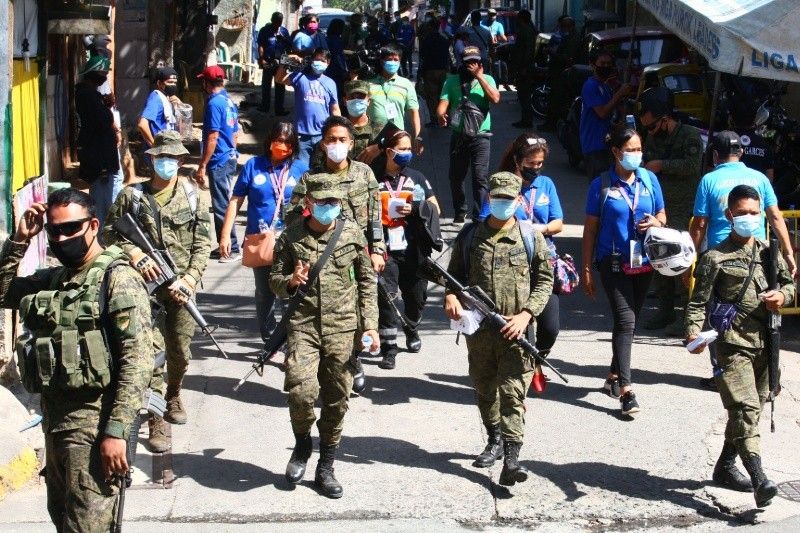ECQ enforcement chief says public should follow rules, respect cops to avoid incidents

MANILA, Philippines — "It takes two to tango."
Asked about instances of overzealous enforcement of quarantine rules at the hands of police personnel, this is what the head of the enforcement arm of the country's COVID-19 task force responded with.
Speaking in an interview with ANC, Police Lt. Gen. Guillermo Eleazar, Joint Task Force COVID Shield commander, highlighted the need for people to obey guidelines and respect the people enforcing them, saying that if violators do not comply with police directives, then there is really a chance that things will turn violent.
"It is important that cooler heads should always prevail," Eleazar said.
The Philippine National Police is a uniformed service authorized to, at times, use deadly force and its PNP Ethical Doctrine holds that police officers should "use physical force only when the exercise of persuasion, advice and warning is found to be insufficient in the pursuit of law observance or to restore order."
If forced to use violence, they "shall resort only to the minimum degree of physical force necessary on any particular occasion in achieving law enforcement objectives."
The same ethical doctrine states that police may not invoke superior order or exceptional circumstances such as a state of war, a threat to national security, internal political instability or any other public emergency as a justifi cation of torture or other cruel, inhuman or degrading treatment or punishment"
Eleazar, in the interview stressed that “the keyword is still respect."
"If we know how to respect one another, either we would not do provocative actions that could lead to confrontation or would learn how to deescalate a tension. Either way, it is a win-win solution."
There have been documented examples of excesses in the enforcement of the enhanced community quarantine that government agencies and officials have justified.
'Maximum tolerance'
According to Eleazar, who also serves as the national police's deputy chief of operations, there are two sides to every incident, and the general public should also do its part to avoid violent incidents.
"There's a formula we follow. On the side of the people, obey the guidelines and respect the people enforcing the guidelines," Eleazar said.
"On personnel side, observe maximum tolerance and respect the rights of the accused."
CHR Spokesperson Jacqueline de Guia: As a public health measure, the quarantine rules are still bound by legal standards. Any warrantless arrest should be within legal ambit, which strictly provides the specific circumstances when it is merited. @PhilstarNews
— Franco Luna (@FrancoOvrboard) April 25, 2020
However, some documented incidents contradict the police's own manual of operational procedures.
READ: 'By the book': A look at quarantine incidents and police operational procedures
"Our chief gave instructions to our human rights office to issue a reminder again of the guidelines to be followed by personnel in the conduct of our operations," Eleazar said.
The PNP's own operational procedures urge officers to practice maximum tolerance multiple times (Rule 25.1 and Rule 28.6) while its Use of Force Continuum says that light force should be applied only when firm language and verbal directives fail.
Yet the past month's cases include the shooting of a former soldier who had previously had his back turned and his arms raised and the attempted arrest of a man in his own home.
RELATED: Quezon City enforcers to withdraw rap vs 'ECQ violator' they beat with sticks
In a release issued on Wednesday evening, Sen. Leila de Lima highlighted the need for clearer rules of engagement for the enforcement of community quarantine rules, adding that police officers "are expected to make situational decisions that they are not properly trained to do" amid what she called an "escalated tension between civilians and law enforcers."
"This is not right anymore. It is no longer acceptable that what is being reported is violations of human rights committed in the name of upholding enhanced community quarantine rules," De Lima wrote in Filipino.
"Do we need to brandish guns at civilians arguing with quarantine officers?" she added.
'Number of violators going down'
Eleazar stressed that more people would be allowed outdoors in low-risk areas under General Community Quarantine.
"There will still be checkpoints, particularly around the borders. We have our mobile checkpoints at the same time, to check that the occupants of vehicles are authorized persons," he said.
"Aside from checkpoint operations, we need cooperation from everybody in order for us to easily implement guidelines," he added.
READ: Quezon City cop shoots 'mentally challenged' quarantine violator
In an earlier interview with DZMM on Sunday, Eleazar was quoted as saying, "For the GCQ, we'll release a new [Unauthorized Persons Outside Residence] list. Aside from the list, we'll add others who are exempted. The GCQ is more relaxed than the ECQ. Right now, we're still waiting for directives from the IATF."
According to data from the PNP, a total of 29,632 individuals were arrested between Day One of the Luzon-wide lockdown and April 17.
"We need to understand that quarantine does not suspend our constitution and human rights. Our police force and our government have the frightening power to destroy human lives, that is why they are given the burden, and the implicit duty, to hold their temper in the face of dissent," De Lima said.
- Latest
- Trending
































